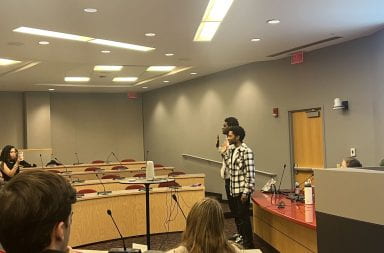Father Roy Bourgeois draws a crowd when he speaks and his visit to Columbus last Thursday was no exception. He came to discuss his support for women’s ordination into priesthood in the Catholic Church. The controversial nature of the issue was evident as pressure from within the local Church hierarchy forced the event to move from the St. Thomas More Newman Center near campus to the Unitarian Universalist Church.
Nearly a year ago, Bourgeois received a letter from the Vatican declaring they would excommunicate him from Catholic Church for refusing to recant his statements and actions regarding women’s ordination. In spite of this, those who came out to listen and engage with Bourgeois insisted on calling him ‘Father,’ recognizing his 37 years as a priest rather than a swift denunciation by Church authorities.
Bourgeois actually began by talking about confronting injustice in Bolivia, where he worked with poor people before being detained and expelled by the US-sponsored dictatorship of Hugo Banzer. He also spoke about his activism against militarism and unjust American foreign policy toward Latin America. Bourgeois is the founder of School of the Americas Watch, a movement to shut down the military facility in Fort Benning, Ga. that has trained tens of thousands of military and police personnel, including some who have committed terrible human rights abuses.
He recounted this experience because it shaped his understanding of justice and injustice.
When Bourgeois applied a critical lens toward the Catholic Church, he could not help but recognize its discrimination for not allowing ordination of women priests. He felt it was necessary to break the silence on the “the sin of sexism” in Church teaching and practice.
Bourgeois makes it clear that his advocacy is informed by women who felt they were called by God to the priesthood and conveyed their experiences to him. Initially, he responded to this with hesitation because he was “part of the all boys club,” but now he believes “the basic question … is who are we as men to say to women that our call is valid but theirs are not. Who are we to negate God’s call of women to the priesthood?”
When Father Bourgeois finished, people in the audience responded with an equal amount of sincerity and passion. They raised other Church related issues such as the shortage of priests, church closings, the priest sexual abuse scandal, and the inclusion of GLBTQ communities. The event finished with a song about remaking the Church to reflect the equality between men and women.
On a superficial level these things may seem like internal Church matters, but the lessons from this debate and struggle are relevant for all of us. Obviously sexism, discrimination and exclusion are broader social issues that are not limited to any one institution. We all operate within hierarchical power structures and it is absolutely essential for us to be self-reflective, and critical of the institutions to which we belong, and the so-called traditions underpinning them.
After hearing Father Bourgeois talk about the importance including women’s voices in decision-making, calling for open debate on the issue, and addressing notions of justice and equality, it is initially hard to understand why any of this is controversial. However, within an extreme societal status quo that normalizes discrimination, inequalit, and oppression, following one’s well-grounded conscience is rendered controversial.
In such a situation, Father Bourgeois’ words on solidarity and breaking silence resonate:
“When the injustice became very clear, so clear, I mean I could not simply be silent. Silence, I have come to believe is the voice of complicity.”


